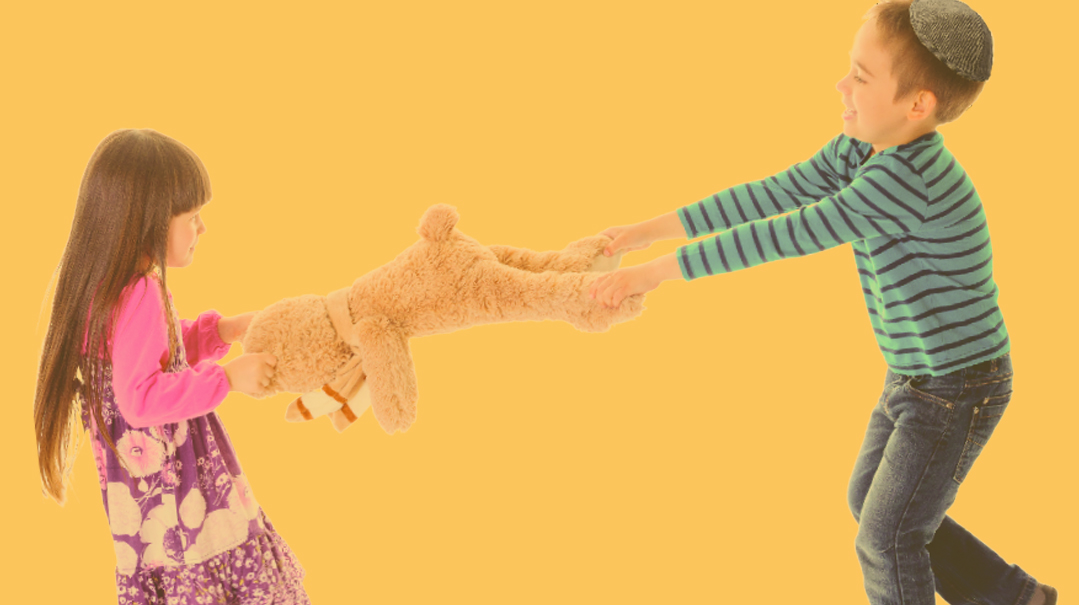The Teen Tightrope
| March 10, 2021How to break free when your teen is holding the family hostage

The Problem: Challenging adolescent behavior
Tools used: Psycho-education on the teen brain, learning boundary setting, and empowering resilience
When Devorah called me, she sounded like she was at the end of her rope. She felt that the behavior of her third child, Miri, was out of control, and she couldn’t handle the family dynamic any longer. We scheduled an appointment with her and her husband, Yitzchak, for the following week.
Devorah and Yitzchak arrived with tentative smiles. After filling out the intake documents, they settled comfortably onto the couch.
“It’s so nice to meet you both,” I said. “I spoke with Devorah briefly on the phone, but can you tell me more about why you’re seeking support?”
Devorah looked imploringly at her husband. He gave the universal gesture of parental exhaustion: the temple rub. “I actually don’t know how we got here, because Miri is a good kid. It’s like it went from fine to completely unmanageable, but it’s hard to pinpoint exactly why. That’s why we pushed off getting help for so long.”
“We should’ve come two years ago,” Devorah said with a sigh.
“You’re here now and that’s a brave step. Do you mind sharing what’s making it feel so unmanageable?”
“Don’t misunderstand me. Devorah is an amazing mother. She’s dedicated and organized and everything generally runs well. Life’s busy, and the house is running okay, so I guess unmanageable isn’t the right word…” said Yitzchak.
“It is, Yitzchak. It’s so unpleasant at home, I don’t think I can manage it one more day. She’s generally at least somewhat respectful to you, but she has no filter with me anymore.”
“Let’s back up a bit. Can you tell me who’s in your family? As you talk, I’m going draw a genogram — that’s a simple pictorial diagram that will include your kids’ names and ages and anything you want to tell me about them.”
“Sure. So Gavriel’s our oldest. He’s 17. He’s a sweet boy, helpful when he’s around, loves to learn, and is in yeshivah most of the time,” said Devorah. “Shevy’s 16. She’s quiet and responsible. As a child she had some learning difficulties, but we got her extra help, and she’s doing fine. I mean, I hope she is. She’s never been the expressive type, but she toes the line, so I guess that’s a good thing.”
I nodded as I wrote, allowing the parents to choose their words and reflect on their children with thoughtfulness.
“Miri’s next, and she’s the impetus for our call. She’s 14.” Devorah looked weary just thinking about her. “I don’t even know how to describe it.”
“She’s rude,” Yitzchak offered. “Obnoxious. Entitled. But not always. She’s a firecracker. Funny and inventive. She can be very helpful and sweet one day and a tyrant another. That’s why we’re so confused.”
“Yeah, she doesn’t fit the typical rebellious teen profile at all. She does pretty well in school. Sometimes I get calls that she skipped class or she talks too much and is disruptive, but nothing crazy. But her attitude, especially at home, can be so unpleasant, and it affects us all.
“It started when she was 11 or 12. I thought we were nailing the teenager parenting because of Gavriel and Shevy, but her behavior is just so… irritating. It’s exhausting at this point.”
“I’ll give an example,” Yitzchak interjected. “She woke up this morning and couldn’t find her uniform. It was literally like a bear was prowling the halls. She was blaming, criticizing, yelling. Totally irrational.
“Devorah found it under her bed because Miri refused to put her laundry away, and it had gotten lost there. Miri refused to acknowledge that her behavior was out of control. She grabbed an apple and left for the day. When she came home later from school, we didn’t want to mention anything and poke the bear, if you know what I mean. It’s a silly example, but this happens all the time.”
“It sounds like Miri has some typical and challenging behaviors common to many adolescents. Normal obnoxious, perhaps? We’ll definitely get back to her, but can we continue getting to know everyone in the family?”
“Sure. After Miri is Moshe. He’s 11. He’s a great kid: energetic, funny, and astute.” Devorah smiled as she spoke about him. “He ignores Miri when she’s in her moods, and because he’s a little charmer, she basically spares him her tirades. Our ‘babies’ are twin girls, Ahuva and Aliza. They’re eight, and are adorable.
“I think they’re a bit immature for their age, but it could just be because they’ve always been in their own little world together. Aliza cries a lot, and Miri antagonizes her often and calls her a crybaby or other disparaging names. Miri can interact with the twins beautifully, but the second they don’t do what she wants, she drops them, and can get really nasty.”
“It sounds like Miri’s behavior is pretty erratic. For the purposes of goal setting, what’s your miracle? Suppose tonight, while you slept, a miracle occurred. When you wake up tomorrow, what would be some of the things you would notice that would tell you that life had suddenly gotten better?”
Devorah’s answer came instantly. “I wouldn’t be scared of my daughter’s overreactions, and I wouldn’t be scared of being firm with her.”
“There’d be more simchah in our home, not a roller coaster of emotion and tension,” Yitzchak ventured.
“What would that look like? Can you be specific?”
“Miri wakes up, late and disorganized, but instead of blaming everyone else, she stays calm and figures out how to help herself. She doesn’t antagonize everyone if they don’t do exactly as she says or thinks. She comes home from school and after some chill-out time, she joins us for dinner, actually talks at the table, does homework, and goes to bed.
“She doesn’t scream, yell, degrade and not everything is a battle. She doesn’t say everything is ‘unfair,’ ‘not normal,’ or that we’re ‘super mean.’ Is this so crazy? Like does a miracle really need to occur to see this?” asked Devorah.
“That’s what’s been difficult, Devorah.” Yitzchak turned to his wife. “It doesn’t seem complicated or crazy in terms of expectations, but it’s not happening.”
“That’s why you took this great step in coming for therapy. And the miracle question doesn’t mean it would take a miracle for it to happen. It’s just a quick and easy way to frame goal setting. We’re at the end of our session for today, but next time, I think it would be useful to discuss the teenage brain and how the biological reality of adolescence can affect everything.”
“Sounds great.” Devorah and Yitzchak booked a session for the following week.
The Teenage Brain
“Hi!” I said with a smile. “Welcome back. How was your week since I saw you last?”
“It was good.” Devorah smiled and brushed her auburn sheitel off her face. Yitzchak adjusted his yarmulke and shifted in his seat.
“We kept talking about that miracle question. Like every time something went wrong, we thought about what our goal is for Miri and the rest of the family,” said Devorah.
“That’s great reflection!”
“Yes, I think we really got clarity from it. Miri is definitely the main issue. She acts so entitled. However, I saw it in a quiet way with Shevy, too. But because she’s not loud about it, I tolerate it more. Does that make sense?”
“Yes, totally.”
“I just really want to know how to stop these patterns of behavior. You mentioned something last week about teenage brains?”
“Yes, so let’s talk teenagers. If you understand a little more what’s going on biologically and chemically for Miri — and all your teenagers — it might be easier to understand their behaviors and reactions.”
Devorah and Yitzchak looked expectant. Devorah reached for the clipboard and pen I keep near my desk for clients.
“The brain develops rapidly in the first five years of life. All the structure and building blocks are present by age nine, but the different centers of the brain develop and become more functionally connected over time,” I started. Devorah nodded as she took notes.
“There are parts of the brain that are automatic, like the brain stem that regulates breathing, heart rate, and body temperature. Some parts of the brain develop very early in childhood, like those responsible for coordination, balance, hearing, learning, and feelings.
“The part of our brain called the frontal lobe is essentially our ‘control panel,’ and it controls things like emotional expression, problem solving, memory, language, judgement, and awareness of long-term consequences. However, it’s the last part of our brains to fully mature. It actually doesn’t fully finish developing until we’re in our mid-twenties.”
“What?! I had like, two kids before my brain was fully developed?” Devorah half- laughed, mouth agape.
“Yes.” I laughed with her. “What that means is that it doesn’t matter how smart teens are or how well they scored on their midterms, good judgement isn’t something adolescents can excel in — at least not yet — due to their biological and neurochemical reality.”
“So that explains why Miri can bring home a good report card, yet her behavior is barely passable.” Yitzchak looked interested.
“Correct. And it goes beyond just development. Adult and teen brains work differently; an adult processes with her prefrontal cortex, while a teen processes that same information with her amygdala. That’s the highly reactive, emotional part, and is often associated with the fight/flight/freeze mechanism in our brains.”
“Highly reactive and emotional describes Miri to a T,” Yitzchak said with a sigh.
“Yes, and the connections between the emotional part of the brain and the decision- making center don’t develop necessarily at the same rate, so that’s why when teens experience overwhelming emotional input, they can’t explain later what they were thinking. They weren’t thinking as much as feeling.”
“It’s just so strange they can’t control it. Or some are better at controlling it than others. But I guess I was a teenager a long time ago so I forget,” said Devorah.
“Well, I think we can sometimes relate,” I offered. “Imagine you lost your keys, and you’re already late for work. You panic. You’re no longer thinking rationally; the keys don’t magically appear in the place you already looked ten times, but you’re thinking with your emotions so you look there again and again. Now, think about how it feels if someone tells you to calm down and think sensibly about when you last had your keys.”
Devorah laughed. “Oh! This happened last week. I thought I was going to scream. I was late for a dentist appointment I’d waited eight months for and couldn’t find my keys. I was running all over the house, boiling in my winter coat. It turned out that Yitz took my keys by accident. ‘Not thinking rationally’ is far too gentle a description. I was acting cuckoo.”
“Right! So that could be how Miri feels a lot of the time.”
Yitzchak and Devorah silently mulled over this information.
A Benevolent Dictatorship
“So, how does this little neuroscience lesson connect to Miri’s behavior at home? Well, if you keep in mind that she’s constantly ‘thinking through feeling,’ then it’s understandable from her perspective why she overreacts. She doesn’t have the ability to determine what the reality is. That ‘not normal’ or ‘mean’ parent might just be setting boundaries she doesn’t realize are beneficial.
“Here’s a general homework assignment: Instead of getting upset when Miri impulsively make bad choices, help her see that through by connecting her behaviors and actions with their consequences. You can actually help her create new neuro networks. Because teens have a difficult time seeing the long-term consequences of their actions, it’s our responsibility to set and enforce boundaries to keep them safe.”
“Safe? We keep our kids safe. We really try to create a warm environment where the kids are happy to come home too.” Yitzchak sounded somewhat defensive.
“Yes! I see what dedicated parents you are and how in-tune you are with your kids. There are two sides to this attunement, though. Many households have ‘mini-democracy’ where a child’s voice or opinion is equal to those of his/her parents. In some families, the child’s voice even takes over. And in other families, certain parents will even fully sacrifice their own needs to make their children happy. This is increasingly true in our community, as there’s a lot of fear about ‘turning a child off’ and potentially causing disinterest in Yiddishkeit.”
Devorah and Yitzchak eyed each other. “That’s such a fear of mine,” Devorah shared. “I keep hearing to just love and accept my kids. I do, but now I’m scared to set any limits because of how they — especially Miri — will react, and if there will be any long-term consequences because of it.”
“Yes. That’s been a general shift culturally. We see that the pendulum has swung from focusing on children’s behavior, as they did in previous generations, to focusing on children’s emotions. But along with this, we’ve also seen an increase in anxiety disorders in children and teens. Although it’s extremely important for children’s emotions to be heard and validated, a parent still needs to be in charge to create a secure and stable environment for their kids.”
“My parents were so old-school,” Yitzchak said with a wan smile. “I don’t think I ever said no to my parents. It didn’t matter how upset I was, I never talked back. I didn’t even think I was right, because who even thinks they know better than their parents? My kids, that’s who. We spend so much time talking about feelings, I feel like everything is up for discussion.”
“I hear what you’re saying. And there’s a really beautiful part to that way of parenting as well. Nurturing our children, and being tuned in to our kids’ emotional needs and worlds is an incredible and gentle part of parenting. It’s just necessary to balance that ability to validate and empathize with setting boundaries and upholding responsibility and accountability.”
“I get why kids need responsibility: to learn how to become proper grownups. But I don’t really understand this link between responsibility and safety,” Devorah said.
“Secure boundaries set by the parents — not ones negotiated by the child — reduce anxiety. Rules and routines like meal times, bedtimes, homework time, and screen time that are set and monitored by the parent, create predictability in a child’s life. Predictability reduces uncertainty, and that reduces anxiety. Parents shouldn’t value a child’s self-expression over a child’s sense of security.”
“I hear that, but what if they don’t agree with what keeps them safe? Let’s say that at 10:30, I tell Miri it’s bedtime, and she says she’s not tired. How can I argue with that? And then she tells me I’m unfair and mean if I insist she go to bed. Isn’t a mean parent an unsafe parent?”
“Do you think you’re being mean by telling your 14-year-old that lights out is at 10:30?” I asked.
“No. Not mean, but…maybe… I don’t know how she feels.”
“Maybe she isn’t tired, and maybe she’ll have to lie in bed for a bit counting sheep, but if you let her stay up, it would come at a cost of Miri’s sense of security because it allows her to feel she has more power than you. Parents who set boundaries aren’t trying to make their child happy in the moment, rather they’re trying to have their child develop skills to successfully launch into the world at 18.”
Devorah and Yitzchak nodded silently.
“For this week, can you try to enforce a few boundaries or rules in your house and see if you can switch from a democracy to a benevolent dictatorship?” I said with a smile.
“Okay. What rules, Yitz?” Devorah turned toward her husband.
“No name calling. No door slamming, and everyone eats together at dinner time. I like having that seder in the day with the kids, and Devorah works so hard to prepare supper, I hate how the kids don’t sit down properly to enjoy it,” Yitzchak offered.
“Ooh! Good ones,” said Devorah. “Okay. Do we just inform them?”
“Yes. You can just simply state that these are the expectations going forward. You didn’t choose outlandish rules. This is helpful because a) it establishes you as an authority and b) it’s basic safety. There should be no bullying in the home — emotional and physical aggression can’t be tolerated.”
As the session ended, Devorah and Yitzchak left with a sense of purpose and determination. When they came in the following week, they were ready to get straight to business.
Gentle but Strong
“It’s crazy. We realized just how much is up for discussion with our kids. Especially for Miri. She’s always negotiating. She couldn’t negotiate her way out of the no-name calling and door slamming, but she tried to get out of dinner every night. It’s like she was just looking to assert herself, for no reason at all.”
“It’s hard that she gets so angry when we try to implement new things. The other kids really respected it, though. It felt good to establish our authority without apologies,” Yitzchak said.
“Right. It isn’t about suddenly turning into a drill sergeant. The rules you mentioned were not hard-handed. It’s about taking that beautiful gentle approach and marrying it with strength and safety.”
“What do you mean?”
“Say Miri doesn’t feel like sitting down for dinner with the rest of the family, so she yells and says the family is ‘not normal’ and ‘controlling.’ You can simultaneously accept everything she’s feeling and set limits around her behavior.
“Perhaps try: ‘It looks like you’re really upset, Miri. It is hard not to eat when you want, but being disrespectful will not be tolerated.’ Then insert whatever consequence you choose if there is no change. This will allow Miri to feel heard, but also become aware of boundaries.”
“It’s really important to me as a mother to allow my kids to feel all their feelings,” Devorah shared, chewing the inside of her cheek.
“It’s healthy to feel our feelings, but we can’t just explode when we feel too intensely. The problem isn’t the anxiety or anger, it’s what we do when we feel that way.”
“That makes sense. It’s just not allowing Miri’s reactions to her emotions to take over,” Devorah offered thoughtfully.
“Exactly. Unless the early-development narcissism is eventually disrupted, children continue to feel like the world revolves around them and become narcissistic adults. Parental boundaries allow children to grow up, to understand they can’t always get their way, to be more patient and mature. Understanding the meaning of ‘limits’ allows kids to be more connected to the real world. Yitzchak, you mentioned the word entitled in our first session. Can you explain that more?” I asked.
“Miri just expects everything to go smoothly, and when it doesn’t go that way, she loses it. Like when she couldn’t find her school uniform.”
“Have you ever heard the term ‘helicopter parenting?’ ” I asked. They nodded.
“There’s also lawn-mower parenting. Think of it like mowing down all that tall grass and weeds in front of our kids, so they have an easy time walking down the path instead. We do that when we don’t want our kids to struggle. But when we vigilantly anticipate problems before they happen, we’re not helping our kids become stronger. We forget that the path ahead is bumpy; boulders and obstacles are littered along our life trails and our children’s, because that’s how we all grow and mature.”
“I hear that. I just love my kids so much. How can I watch them struggle? I can’t go from being so loving and nurturing to a ‘my way or the highway’ and ‘figure it out yourself, kid’ type of parent.” Devorah was concerned.
“Just like we can nurture feelings and still keep boundaries, we can allow our kids to figure some things out on their own, even — or especially — when it’s uncomfortable. You can be an active supporter when there’s an issue or conflict, but don’t step in as the hero who will fix everything. Allow your child to feel capable and in-charge of addressing her own problems.”
“I like being that hero for my kids,” Yitzchak ventured.
“That’s really honest and sweet in many ways. However, what if you taught your kids to learn the power of their own intuition?”
“How?”
“If Miri is having a hard time with a friend, if you invite her to consider her own wisdom, rather than telling her what to do, she’ll become more self-aware. And if she chooses unwisely? You can normalize mistakes, setbacks, and failures. These are essential parts of the learning and maturation process.”
“I like this because from the last couple of sessions, we disempowered some of the bad behavior, but this is empowering Miri in a positive way,” said Devorah.
“Yes! So next time she has an issue, don’t swoop in and save. If she has an issue, you can be an active supporter by asking questions, but not by taking it over yourself. You can remind them how competent they are. Validate the struggle but let them muddle through a bit.”
“That’s going to be such a shift. I love giving to my kids, and I hate them to feel uncomfortable. I just have to remember that it’s actually healthier for them in the future,” Devorah said thoughtfully.
“This developing resilience, by the way, is only in the context of a safe struggle, like homework, chores, and some sibling/friend conflict. If it’s an unsafe struggle, then kids do need parental intervention.”
“What’s the homework for this week?” Yitzchak asked, eyeing the time.
“Sit down with Miri and have a discussion with her about her great parts — that energetic, smart part of herself. You can ask her about a minor challenge — usually teens have a few a week at least, and discuss how she can solve it. Even if she wasn’t needing you to do it, and it was minor, it’s still super helpful to do this exercise so Miri can start to develop her own relational intuition and tolerate struggle a bit more. This should have a positive effect on her emotional expression as she gains more confidence in handling challenges.”
“So you really think the reason she’s been so unmanageable is because she doesn’t know how to problem-solve?”
“I think the combination of that, her adolescent brain, and a perceived lack of authority in the home contributed to her volatile and unpredictable outbursts,” I said.
Devorah and Yitzchak nodded as they stood up to leave. “When should our next session be?”
“Let’s see how these changes get integrated at home. You’ll be practicing not only with Miri, but all of the kids. Let’s check back in in a few weeks to see how you’re doing with boundary setting and resilience building.” We booked for three weeks’ time, between Purim and Pesach 2020.
Life, as you know, unfolded the way it did, and it was five weeks until we met again on Zoom, and by then everyone was somewhat in the lockdown groove. Despite the close quarters, Miri’s explosive behavior had dissipated. Stricter boundaries and empowering Miri to help herself had contributed to her being able to regulate her emotions better.
Devorah and Yitzchak still connect for support, once in a while, but much to their — and their kids’ — great pleasure, they’ve been able to incorporate that beautiful balance of boundary keepers and soul-nurturers.
Devorah and Yitzchak’s Toolkit
The building blocks for the approach I worked on with this couple can help any parent striving to create a solid home environment for her teen:
- Have a vision: Clarify your expectations of your family experience. This will help you determine what’s important to focus on.
- Make that link: Discuss the consequences of choices and actions. This help teens make the connection and wires the brain to make this link more often.
- Establish a few non-negotiable rules in your home: This keeps the parental hierarchy intact and fosters a feeling of safety. Everyone has a need to feel emotionally and physically safe at home.
- Don’t swoop in and save: Validate the struggle (“That must be upsetting”) and then ask questions like: “How did you solve this in the past?” “What do you need to resolve this issue?” If the problem is big, you can add, “How can I help you?” This may look like doing something concrete or just listening. Modeling problem-solving strategies is key here.
- Understand the difference between a safe and unsafe struggle: Don’t let kids go at it alone in the case of bullying, struggling with learning disability, or experimenting with risky behaviors. If it’s an unsafe struggle, then step in as a parent, even without your children’s permission.
Abby Delouya is trained in EMDR and maintains a private therapy practice for individuals and couples in Montreal, Canada.
(Originally featured in Family First, Issue 734)
Oops! We could not locate your form.











